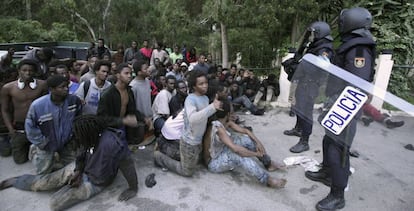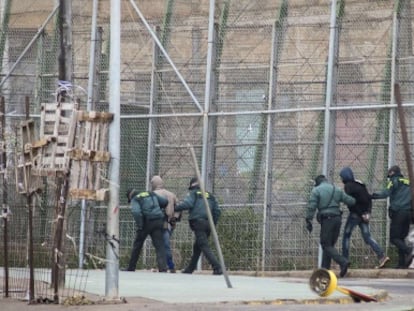Incursions at Spain’s North African exclaves triple after Moroccan threats
Sources at border complain Rabat is not cooperating in controlling border crossings
On Monday, February 6, Morocco’s agriculture minister, Aziz Akhannouch, released a statement warning that any obstacles to his country’s agriculture and fishing exports to Europe could renew the “migration flows” that Rabat has “managed and maintained” with “sustained effort.”

A few hours later, he told Spain’s EFE news agency: “How do you [Europe] expect us to do the work of blocking African and even Moroccan emigration if Europe doesn’t want to work with us? Why should we continue acting as police and giving them [Africans in Morocco] work?” He added: “The immigration problem is very expensive for Morocco, and Europe should appreciate its true worth.”
On the same day, at 7.40am, 18 African migrants made it over the fence from Morocco into the Spanish exclave of Melilla. On Friday, February 17, 497 immigrants without papers managed to make their way around the border fence into Spain’s other Moroccan exclave, Ceuta. Three days after that, another group of 356 people got over the fence using cutters and other tools. In barely 72 hours, 853 people made it into Spanish territory, almost half the 1,771 that made it into Ceuta in 2016.
This is the result of complicity… Europe has allowed Morocco to behave as it likes Mohamed Salem Salek, Foreign Minister of Sahrawi Arab Democratic Republic
Spain says that Morocco is cooperating in maintaining the border: Foreign Minister Alfonso Dastis said in a radio interview on February 23 that Rabat was cooperating “impeccably,” adding he did not believe the authorities in Morocco were deliberately allowing the mass breakthroughs at the border.
Nicolás Fernández, the Spanish government’s delegate in Ceuta, told EL PAÍS “there is no evidence that there has been any change in collaboration,” noting: “On February 21, another 300 immigrants tried to enter and it was Moroccan forces that prevented it.” Nevertheless, Aziz Akhannouch’s threat was heard in Europe.
Spanish security forces have also corroborated the government’s line to EL PAÍS: “It is impossible sometimes to prevent incursions. Sadly, they will continue to happen. But for the moment, Morocco’s actions have been beyond reproach.”
But Rafael Morante, of the Civil Guard unit that was on duty on the Spanish side of the border on the night of February 17, says he saw a group of immigrants running along the fence in the Sidi Ibrahim area. “They passed by two Moroccan military camps and the gendarmes didn’t come out.” In less than two minutes, the group had cut through the fence. The eight soldiers responsible for the eight kilometers of fence that night could do nothing. “Morocco has slowed down a lot, it is falling behind in terms of cooperation,” adds Omar Mohamed, who is with the AUGC Civil Guard labor union.
Reduan Mohamed, migration spokesperson for the anti-austerity party Podemos in Ceuta, points to a number of factors to explain the spike in fence crossings, among them reduced visibility on the coast, and the fact that migrants are better organized and equipped to cut through the fence.
Maite Pérez, who is with an NGO that works with migrants who have made it into Spanish territory, says that “Morocco has relaxed, it is less aggressive.” Her view is shared by Helena Maleno, a researcher specializing in migration who says migrants she has spoken to that made it over the wire on February 17, and in the following days, said they had encountered fewer obstacles on the Moroccan side than they expected.
Legal battle
The backdrop to the recent spikes in mass breakthroughs at the border are legal challenges to Rabat’s trade deals with the EU. A case is currently being heard at the Court of Justice of the European Union brought by the Polisario Front, which has been fighting Morocco’s annexation of Western Sahara for almost four decades. Polisario challenges Morocco’s right to exploit the natural resources of the area, which are part of a 2012 agreement between Brussels and Rabat.
The Polisario Front has also appealed against the EU’s 2013 fisheries deal with Morocco, which runs until 2018.
Morocco understands the importance to Brussels of its cooperation not just in the area of immigration, but in the fight against Jihadist terrorism. Spain has repeatedly highlighted Rabat’s key role in this regard.
Morocco has slowed down a lot, it is falling behind in terms of cooperation Omar Mohamed, AIGC Civil Guard labor union
But Mohamed Salem Salek, the foreign minister of the Sahrawi Arab Democratic Republic, the partially recognized state that controls a thin strip in Western Sahara and claims sovereignty over the entire territory, says that Rabat is blackmailing the EU.
“It is absolutely impossible for a large group of people to gather near the bay in Ceuta or Melilla without the [Moroccan] gendarmes giving them the green light,” he says by phone.
“I understand that the Europeans are in a difficult situation. But this is the result of the policy of complicity… Europe has allowed Morocco to behave as it likes. Europe wants stability in Morocco. And so do we. But Brussels has to know that it is us, along with Algeria and Mauritania, who are defending Europe against terrorism and illegal migration. Morocco is just the final stage.”
English version by Nick Lyne.
Tu suscripción se está usando en otro dispositivo
¿Quieres añadir otro usuario a tu suscripción?
Si continúas leyendo en este dispositivo, no se podrá leer en el otro.
FlechaTu suscripción se está usando en otro dispositivo y solo puedes acceder a EL PAÍS desde un dispositivo a la vez.
Si quieres compartir tu cuenta, cambia tu suscripción a la modalidad Premium, así podrás añadir otro usuario. Cada uno accederá con su propia cuenta de email, lo que os permitirá personalizar vuestra experiencia en EL PAÍS.
En el caso de no saber quién está usando tu cuenta, te recomendamos cambiar tu contraseña aquí.
Si decides continuar compartiendo tu cuenta, este mensaje se mostrará en tu dispositivo y en el de la otra persona que está usando tu cuenta de forma indefinida, afectando a tu experiencia de lectura. Puedes consultar aquí los términos y condiciones de la suscripción digital.










































